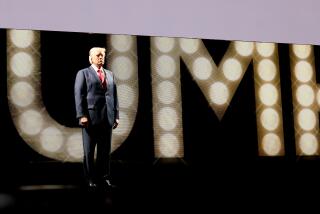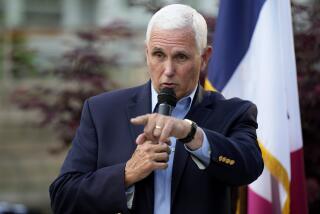Conservatives pick Romney in straw poll
- Share via
WASHINGTON — Republican presidential candidate Mitt Romney is struggling in national public opinion polls but, after a concerted effort, was named the winner Saturday of a straw poll of conservative activists at an annual gathering.
Despite skepticism about his record on social issues, the former Massachusetts governor received 21% of the 1,705 votes cast by paid attendees to the Conservative Political Action Conference who were asked to name their top choice for the 2008 GOP presidential nomination.
Former New York Mayor Rudolph W. Giuliani, whose past positions on abortion and gay rights also stand at odds with social conservatives, came in second in the informal poll, with 17% of the votes.
Both men received standing ovations from the thousands of conservatives who gathered for three days to, among other things, assess damage to their once powerful movement inflicted by the increasingly costly war in Iraq and the 2006 election.
Sen. John McCain of Arizona, the only leading candidate who did not attend the event, received 12% of the votes, and the mention of his name drew occasional boos from the audience.
McCain came in behind his Senate colleague Sam Brownback of Kansas. Backed enthusiastically by social conservatives who admire his strong opposition to abortion, Brownback received 15% of the votes.
Former House Speaker Newt Gingrich of Georgia, who hasn’t decided whether to run, also topped McCain, receiving 14% in the straw vote.
Romney’s win among the conservatives gathered in Washington contrasts with his showing in other polls. A Newsweek poll released this weekend shows Giuliani surging ahead of McCain and Romney among Republican voters.
The former mayor led McCain 59% to 34% in the Newsweek poll. When matched against Romney in the poll, Giuliani led the former governor 70% to 20%. In a McCain-Romney matchup, respondents preferred McCain by 59% to 26%.
Giuliani also did well when pitted against Democrats. Giuliani was closely matched against Sen. Hillary Rodham Clinton of New York in the Newsweek poll, with 47% to her 46%. When paired up against Sen. Barack Obama of Illinois, he led 48% to 43%. The margin of error for the poll was 3 percentage points.
The poll provided another, incidental boost for the former mayor: Eighty-two percent of registered Republicans surveyed said a candidate’s marital history was not an important consideration for them. Giuliani has been married three times.
Though behind in the polls, Romney has racked up endorsements from prominent Republican officeholders and party leaders. He has been pushing to establish his bona fides among conservatives who have openly worried about his changing positions on abortion and gay rights issues.
Romney paid the registration fees of some student attendees, and his campaign’s representatives were visible throughout the conference.
Giuliani has not disavowed his advocacy on some social issues but has pledged to appoint “strict constructionist judges” if elected.
He received a warm reception when he spoke.
A ballot that combined conference attendees’ first and second choices for the Republican nomination in 2008 showed Giuliani coming in first with 34%, compared with Romney and Gingrich, who were tied for second with 30%. McCain received 20% in the combined category.
Conservatives pondering how to respond to the Democratic takeover on Capitol Hill received no shortage of recommendations during the three-day conference. Many speakers such as author and activist Richard Viguerie said party leaders had lost their way and had betrayed true conservatism.
Minnesota Gov. Tim Pawlenty called on conservatives to address populist concerns such as healthcare, the environment and economic security.
This year’s parade of candidates at the conservative gathering “is a reflection of the fact that there is no Reagan in the field,” said David A. Keene, chairman of the American Conservative Union, which sponsored the convention. “It is not a slam dunk for anybody.”
Keene said he detected a detached skepticism among this year’s conventioneers.
“You see the attentiveness with which people are listening -- it’s not with adoration,” he said. “They view themselves more as judges than advocates.”
More to Read
Get the L.A. Times Politics newsletter
Deeply reported insights into legislation, politics and policy from Sacramento, Washington and beyond. In your inbox three times per week.
You may occasionally receive promotional content from the Los Angeles Times.










